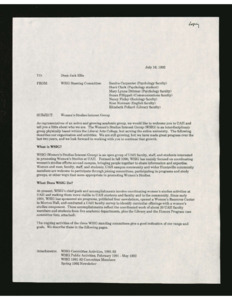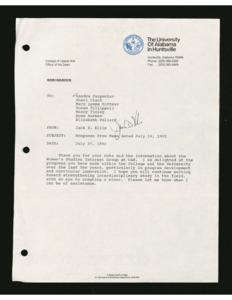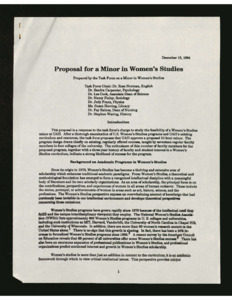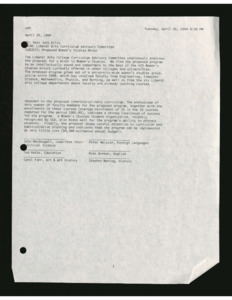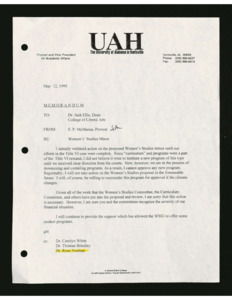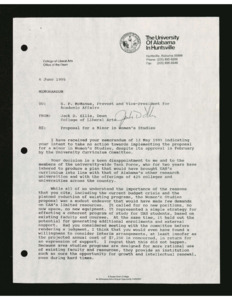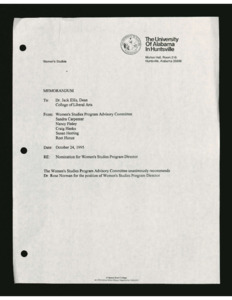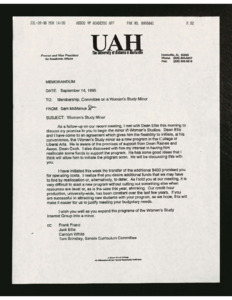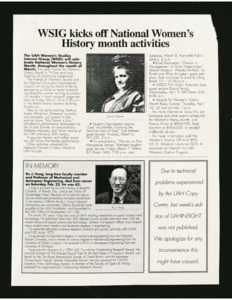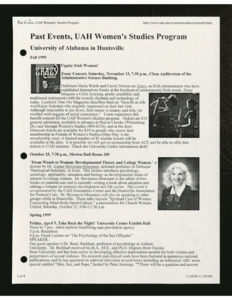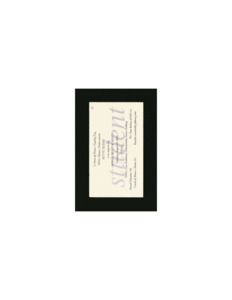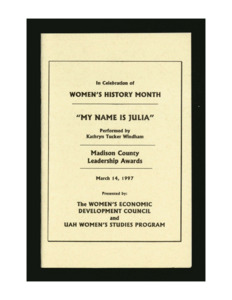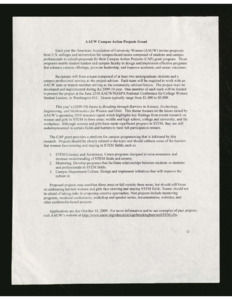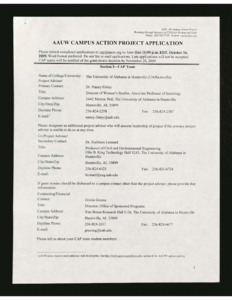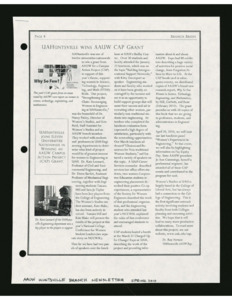History of WGS
Creating the Minor
UAH's Women's, Gender, and Sexuality Studies (WGS) program was first created in 1995, much later than other universities' similar programs. As a result, the WGS program had to distinguish itself from other programs, and find a way to make that distinction in the South, exacerbating the already difficult task. As a result, the fledgling program differentiated itself by focusing on local community outreach and political activism, booking events and speakers that covered contemporary political discussions such as opposition to the War on Terror and LGBTQIA+ community rights.
The creation of the Women's Studies minor was a task that required years of preparation and effort from a multitude of people. These notable women consisted of Rose Norman from the English department, Nancy Finley from the Sociology department, Elizabeth Pollard from the Library, Sandra Carpenter and Mary Lynne Dittmar from the Psychology department, and Susan Fillippeli from the Communications department. Concentrated efforts to create the program were spearheaded by this group of women in 1992, when the board of the Women's Studies Interest Group reached out to other faculty to promote courses that relate to Women's Studies topics.
Such efforts proved fruitful after the minor was created, since many professors proposed classes for the Women's Studies minor.
One of the Women's Studies program's most powerful early supporters was the Dean of the College of Arts, Humanities, and Social Sciences (at the time known as the College of Liberal Arts), Jack Ellis. The Women's Studies Interest Group reached out to him during the summer of 1992, where Jack Ellis swiftly responded with support for the creation of the Women's Studies minor, and enthusiastically offered help in any way he could.
The proposal went through many iterations, but the committee confirmed the final changes and the proposal went for review in December of 1994. The Curriculum Committee for the College of Arts, Humanities, and Social Sciences unanimously supported the proposal, citing the strength of the curriculum and success in enrollment for proposed classes. However, the fight to create a minor was not over yet.
With the support of the CAHSS Dean and Curriculum Committee, the program faced one last obstacle: the Provost of the University. Despite the support for creating the women's studies program, the Provost denied creating the program due to the ongoing court case against all universities in the state of Alabama. While the denial disappointed the people who worked to create the program, the Provost irritated Dean Ellis with Ellis responding to the denial with a strongly worded disagreement.
However, the denial of the Women's Studies minor lasted a short time, as the Provost reversed the original decision to deny the creation of the minor after a few months. With the approval of the minor, Dean Ellis wasted no time to discuss the budget of the program and funding the minor. Afterwards, the Women's Studies Interest Group nominated their first director of the program: Rose Norman.
With the creation of the Women's Studies minor now completed, the program needed to quickly find a way to differentiate itself from the numerous other programs of different universities that created their programs decades prior. In fact, some of the most active voices in the committee attended a conference from the National Women's Scholars Association to discuss how best to stand out. Eventually, the consensus was formed: political activism and community engagement.
In the years immediately after the founding of the program, the committee held multiple political events to engage the community, including keynote speakers and mixers for people interested in women's issues.
What's In a Name?
In summer of 2008, the women's studies leadership would elect to change the name of the program to "Women and Gender Studies" as part of a development in the larger academic discussion. Therefore, the leadership argued that adding the discussion of gender would greater serve the program's purpose, and allow for a better interrogation regarding gender dynamics and the construction of gender.
The Campus Action Project
The women's studies program earned its biggest opportunity a decade and a half after the original founding. This opportunity came from a campus action project sponsored by the American Association of University Women (AAUW). However, the program had to tailor the project to the engineering focus of the AAUW's theme for the year. Therefore, the WS program developed a project focused on getting women into engineering, a largely male-dominated field. The AAUW approved of the project, and awarded the program with a grant.
The Campus Action Project proved incredibly successful and reflected a positive light on the women's studies program. However, the program and its leadership did not rest, instead they elected to continue activist works and hold more events to connect the community, including the incredibly successful EXPO events.
Where Are We Now?
Now, the program uses the "Women's, Gender, and Sexuality Studies" label to encompass all aspects of scholarship under our current iteration. Additionally, the program never lost focus on its dedication to local community activism, using our position at UAH to empower local organizations and network with students. Furthermore, we are about to celebrate the thirtieth anniversary of the program, with the hope of celebrating many more anniversaries in the future.
